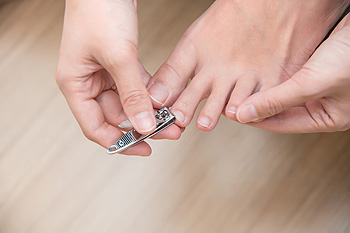 There are many different things that may cause an ingrown toenail to develop. One of the most common causes is wearing shoes that are too tight along with socks and tights. You may also develop an ingrown toenail if you improperly trim your toenail. If you are looking to trim your nails, it is advised that you trim straight across instead of in a rounded shape. If you have an ingrown toenail and want to prevent it from becoming infected, it is crucial that you keep your feet clean. However, if the condition worsens and becomes severe, you may need to have surgery. If you are experiencing any pain and suspect that you have an ingrown toenail, you should see your podiatrist for treatment.
There are many different things that may cause an ingrown toenail to develop. One of the most common causes is wearing shoes that are too tight along with socks and tights. You may also develop an ingrown toenail if you improperly trim your toenail. If you are looking to trim your nails, it is advised that you trim straight across instead of in a rounded shape. If you have an ingrown toenail and want to prevent it from becoming infected, it is crucial that you keep your feet clean. However, if the condition worsens and becomes severe, you may need to have surgery. If you are experiencing any pain and suspect that you have an ingrown toenail, you should see your podiatrist for treatment.
Ingrown toenails may initially present themselves as a minor discomfort, but they may progress into an infection in the skin without proper treatment. For more information about ingrown toenails, contact Dr. Dushack of APEX Foot & Ankle Center. Our doctor can provide the care you need to keep you pain-free and on your feet.
Ingrown Toenails
Ingrown toenails are caused when the corner or side of a toenail grows into the soft flesh surrounding it. They often result in redness, swelling, pain, and in some cases, infection. This condition typically affects the big toe and may recur if it is not treated properly.
Causes
- Improper toenail trimming
- Genetics
- Improper shoe fitting
- Injury from pedicures or nail picking
- Abnormal gait
- Poor hygiene
You are more likely to develop an ingrown toenail if you are obese, have diabetes, arthritis, or have any fungal infection in your nails. Additionally, people who have foot or toe deformities are at a higher risk of developing an ingrown toenail.
Symptoms
Some symptoms of ingrown toenails are redness, swelling, and pain. In rare cases, there may be a yellowish drainage coming from the nail.
Treatment
Ignoring an ingrown toenail can have serious complications. Infections of the nail border can progress to a deeper soft-tissue infection, which can then turn into a bone infection. You should always speak with your podiatrist if you suspect you have an ingrown toenail, especially if you have diabetes or poor circulation.
If you have any questions, please feel free to contact our offices located in Fort Myers and Naples, FL . We offer the newest diagnostic and treatment technologies for all your foot care needs.
Read more about Ingrown Toenail Care